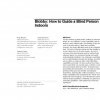Free Online Productivity Tools
i2Speak
i2Symbol
i2OCR
iTex2Img
iWeb2Print
iWeb2Shot
i2Type
iPdf2Split
iPdf2Merge
i2Bopomofo
i2Arabic
i2Style
i2Image
i2PDF
iLatex2Rtf
Sci2ools
CHI
2009
ACM
2009
ACM
Blobby: how to guide a blind person
For the majority of blind people, walking in unknown places is a very difficult, or even impossible, task to perform, when without help. The adoption of the white cane is the main aid to a blind user's mobility. However, the major difficulties arise in the orientation task. The lack of reference points and the inability to access visual cues are its main causes. We aim to overcome this issue allowing users to walk through unknown places, by receiving a familiar and easily understandable feedback. Our preliminary contributions are in understanding, through user studies, how blind users explore an unknown place, their difficulties, capabilities and needs. We also analyzed how these users create their own mental maps, verbalize a route and communicate with each other. Structuring and generalizing this information, we were able to create a prototype that generates familiar and adequate instructions, behaving like a blind companion, one with similar capabilities that understands his &...
| Added | 24 Nov 2009 |
| Updated | 24 Nov 2009 |
| Type | Conference |
| Year | 2009 |
| Where | CHI |
| Authors | Hugo Nicolau, Joaquim A. Jorge, Tiago João Vieira Guerreiro |
Comments (0)

